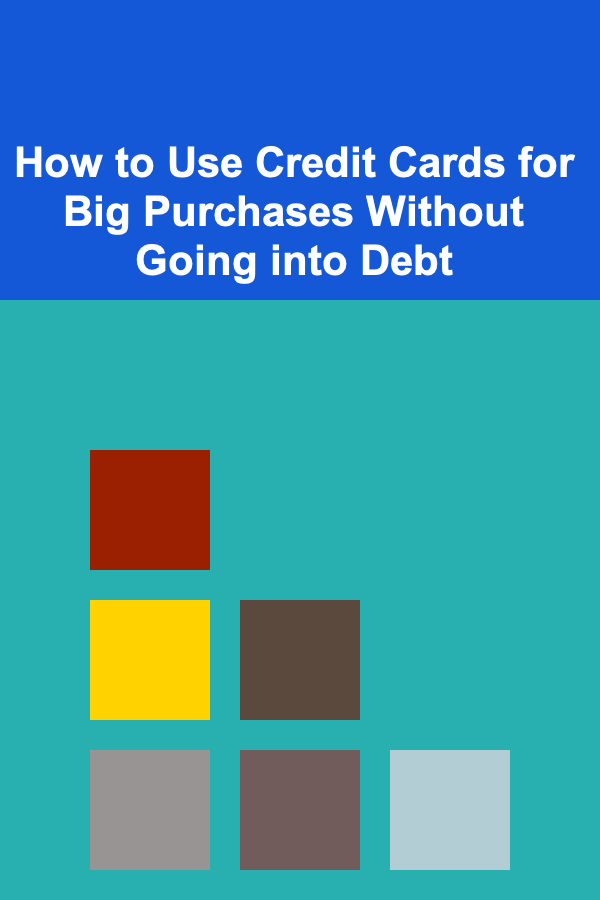
How to Use Credit Cards for Big Purchases Without Going into Debt
ebook include PDF & Audio bundle (Micro Guide)
$12.99$7.99
Limited Time Offer! Order within the next:

Credit cards are one of the most convenient financial tools available today. With just a swipe or tap, you can purchase almost anything you need, whether it's a new laptop, a vacation, or even a major home renovation. However, using a credit card for big purchases without falling into debt requires careful planning, self-discipline, and an understanding of how credit works.
In this article, we'll discuss how you can use credit cards for large purchases responsibly, avoid unnecessary debt, and even take advantage of the benefits credit cards offer, such as rewards and extended warranties. Whether you're preparing for an important purchase or simply looking to get the most out of your credit card, this guide will provide you with the tools you need to make smart financial decisions.
Understand Your Credit Card Terms
Before using your credit card for any big purchase, the first step is to understand the terms of your card. Credit cards come with a variety of features, each of which can impact your ability to repay the balance without incurring excessive interest or fees.
Key Terms to Review:
- Interest Rate (APR): This is the interest you'll pay on your outstanding balance if you don't pay it off in full. A high APR can make it very difficult to pay off a large balance quickly, so aim to avoid carrying a balance.
- Credit Limit: Your credit limit is the maximum amount you can charge to your card. For big purchases, ensure that your limit is high enough to accommodate the purchase without maxing out your card. Maxing out your credit card can hurt your credit score and lead to higher interest rates.
- Grace Period: This is the period between your purchase and the due date for your payment, during which you can pay off the balance without incurring interest. If you can pay the balance in full within this period, you can avoid interest charges entirely.
- Rewards Programs: Many credit cards offer rewards such as cash back, points, or travel miles for every purchase. If your card offers rewards, using it for big purchases can help you accumulate these benefits, which can offset some of the cost.
- Fees: Be aware of any fees associated with your card. This could include annual fees, late payment fees, or foreign transaction fees. Understanding these fees helps you avoid surprises.
Create a Plan to Pay It Off
One of the best ways to use your credit card for large purchases without falling into debt is to create a plan to pay off the balance in full. The longer you carry a balance, the more interest you'll accrue, which can quickly turn a manageable purchase into a much larger expense.
How to Set Up a Payment Plan:
- Know Your Payment Due Date: Ensure you understand when your payment is due. Make sure to pay at least the minimum amount by this date to avoid late fees and penalties. However, it's always best to pay more than the minimum to avoid interest.
- Break Down Your Purchase: For large purchases, break down the total amount into smaller monthly payments. If you buy a $2,000 item, for example, plan to pay it off in 6 months, which would require monthly payments of approximately $333.33. By setting this plan before making the purchase, you can ensure you're financially prepared to handle it.
- Consider a 0% APR Offer: Some credit cards offer 0% APR on purchases for an introductory period (typically 12-18 months). This can be a great option for large purchases, as it allows you to pay off the balance over time without incurring interest. However, make sure you pay off the entire balance before the introductory period ends to avoid paying interest retroactively.
Use Your Credit Card Responsibly
It's easy to get carried away when using a credit card, especially when making big purchases. However, responsible usage is key to avoiding debt. By following some basic guidelines, you can ensure that you're using your card in a way that helps you maintain financial control.
Tips for Responsible Credit Card Use:
- Avoid Making Unnecessary Purchases: Only use your credit card for purchases that are necessary or that you have already planned for. Impulse purchases can quickly add up and make it harder to pay off your balance.
- Track Your Spending: Keep an eye on how much you've spent on your credit card. Many credit card issuers offer mobile apps that allow you to monitor your spending in real-time. This helps you stay on top of your budget and avoid overspending.
- Don't Use Credit for Non-Essential Purchases: For purchases that you don't truly need, it's best to use savings rather than credit. Using credit cards for non-essential purchases can lead to unnecessary debt.
Make Use of Reward Points or Cashback
Many credit cards offer rewards for purchases, especially for big-ticket items. Whether it's cashback, travel miles, or points, using your credit card for a large purchase can be a smart way to earn valuable rewards.
Ways to Maximize Rewards:
- Choose the Right Card: Some credit cards offer higher rewards for certain categories of spending (e.g., travel, groceries, gas). If you're making a large purchase in one of these categories, make sure to use a card that offers higher rewards.
- Pay Attention to Sign-Up Bonuses: Many cards offer lucrative sign-up bonuses if you spend a certain amount within the first few months. If you're planning a big purchase, it might make sense to open a card that offers a bonus that you can earn through that purchase.
- Use Rewards for Future Purchases: If your card offers cashback or points, consider using those rewards to offset future expenses. This can help you reduce your overall spending and make your large purchase more affordable in the long run.
Consider the Pros and Cons of Financing Options
If you're considering using credit cards for big purchases, it's also worth exploring other financing options, especially if you're unable to pay off the full balance immediately.
Financing Options to Consider:
- Store Financing: Some stores offer financing options that allow you to pay off a large purchase in installments, often with 0% interest for a set period. This can be a great way to spread out the payments without paying interest, but be sure to check the terms carefully.
- Personal Loans: If you can't qualify for 0% APR on your credit card, a personal loan may be another option. Personal loans often come with lower interest rates than credit cards and can provide a fixed monthly payment, making it easier to budget.
- Credit Card Balance Transfer: If you already have a balance on a credit card with a high APR, you might want to consider transferring the balance to a card with a 0% introductory rate. This can help you save on interest and give you more time to pay off the balance.
Avoid Falling Into the Debt Trap
Using a credit card responsibly is crucial to avoiding the debt trap. It's easy to fall into the habit of making minimum payments and carrying balances from month to month, but doing so can lead to high interest charges that quickly accumulate.
Steps to Avoid Debt:
- Always Pay More Than the Minimum: The minimum payment on your credit card is typically just a small portion of the total balance, and paying only this amount will mean you end up paying a lot of interest over time. Always aim to pay as much as you can to reduce your balance faster.
- Pay on Time: Late payments not only incur fees but can also harm your credit score. Always make your payments on time to avoid these consequences.
- Monitor Your Credit Utilization: High credit card balances relative to your credit limit can hurt your credit score. Try to keep your credit utilization ratio below 30% to maintain a healthy credit score and avoid higher interest rates.
Conclusion
Using a credit card for big purchases can be an effective way to manage your finances, provided you do so responsibly. By understanding your credit card terms, creating a payment plan, and taking advantage of rewards programs, you can enjoy the benefits of using credit cards without falling into debt. Remember, the key to successful credit card use is to manage your balance, make timely payments, and avoid unnecessary spending. If you follow these steps, you can use your credit card for big purchases with confidence and without compromising your financial well-being.

How to Prepare Your Home for Virtual Tours and Photography
Read More
How to Save Space in a Studio Apartment with Zoning Techniques
Read More
How to Store High-End Shoes to Preserve Their Quality
Read More
How to Utilize Vertical Space for More Storage in Small Rooms
Read More
Mastering Time Management for Students: A Comprehensive Guide
Read More
How to Choose Your First Credit Card
Read MoreOther Products

How to Prepare Your Home for Virtual Tours and Photography
Read More
How to Save Space in a Studio Apartment with Zoning Techniques
Read More
How to Store High-End Shoes to Preserve Their Quality
Read More
How to Utilize Vertical Space for More Storage in Small Rooms
Read More
Mastering Time Management for Students: A Comprehensive Guide
Read More